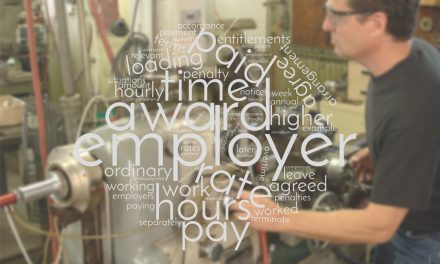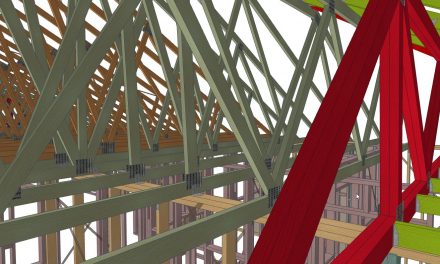ATIF – JOHN HALKETT
Legality compliance training
Training sessions related to the understanding, implementation and compliance requirements of the Illegal Logging Prohibition Act 2012, Illegal Logging Prohibition Regulation 2012 and the ATIF Legality Compliance Toolkit were recently held in Adelaide at Le Messurier Timber & Building Products.
Thanks for the assistance provided by Simon Angove, Lou Boffo and Maureen Pennington.
Another training session is being planned for Melbourne in the near future.
Due diligence assessments
A number of companies have received requests from the Department of Agriculture’s Illegal Logging Compliance Assessment Team to provide information in relation to specific consignments of imported timber product.
The Department’s Team now has a page on compliance on their website, which includes a complete copy of the information notice pack. It can be viewed here: agriculture.gov.au/forestry/policies/illegal-logging/compliance
The ATIF will be meeting with department policy and enforcement officials to review information provided by companies. The industry will then receive feedback to assist in carrying out future legality compliance due diligence assessments.
Global timber forum website
The ATIF has been involved in supporting the development of the Global Timber Forum (GTF). Its website is now live at gtf-info.com. The website provides a source of news, information and data for the timber sector. It is also an international networking and communications platform for people across the timber and associated industries, so that they can engage with others worldwide.
News on the GTF website is categorised under five key themes, all focused on developments and initiatives that highlight the economic, social and environmental benefits of a sustainable and legal timber and forestry sector.
The website also includes an ‘Industry Information’ section, providing accessible industry background information, guidance and market data. This is complemented by an interactive ‘Knowledge Base’, providing contacts and brief profiles of relevant timber and forest industry and associated organisations.
In a major innovation for the timber sector, the website also provides a live, open-access forum facility where site users can post opinions, raise and highlight key issues, ask questions and discuss important new developments. Industry members can respond and provide answers to queries as well, the goal being to provide a global channel for the timber industry that supports dialogue.
I encourage you all to have a look at the GTF website, as it contains lots of information pertinent to all Australian timber companies.
Canadian BC Wood Global Buyers Mission
The 12th annual BC Wood Global Buyers Mission (GBM) will be held from 10 to 12 September 2015, in spectacular Whistler Village, British Columbia.
The 2014 GBM welcomed more than 750 delegates to this invitation-only event, designed to bring together international buyers of timber and value-added timber products to Canadian manufacturers.
Invitees will have the opportunity to meet with Canadian manufacturers of products that include engineered wood products, remanufactured items and components, pre-fabricated housing and structures, millwork, finished building products and specialty timber including Western Red Cedar, all in a comfortable networking environment.
For information and participant lists from past events, visit the GBM Homepage on the BC Wood website at bcwood.com. Enquiries can also be directed to me at john.halkett@bigpond.com or by phone 0417 421 187.
TABMA – COLIN FITZPATRICK
Building trade credit
Over the last 12 months, TABMA’s credit information bureau Building Trade Credit (BTC) has been working closely with its sister organisation, Building Industry Credit Bureau (BICB), to evaluate the benefits and feasibility of forming a joint national credit bureau that would add value to the membership of the respective organisations.
Progress to date includes the development of a trial database for a specific industry sector, where BTC’s and BICB’s databases have been merged. This resulted in a data store of approximately 120,000 entities representing $15 billion in annual credit sales across the building, construction and other related industries.
Building on this platform, the objectives are to:
- Provide access to a national database of trade debtor information for existing members; and,
- Grow membership of the joint national bureau in order to expand the database of trade debtor information available to members.
For more information about this initiative please contact John Theoharris of BTC at john@btconline.com.au, or Wayne Clark of BICB at bicb@bicb.com.au.
Traineeships
In recent weeks we have been contacted by various members and non-members trying to understand the impact of recent changes announced to the Australian and state-based training systems.
In simple terms, understanding the process of accessing government funding to complete training for full or part-time qualifications can be challenging. Accessing this funding can be cumbersome, and even more difficult if you have a previous qualification.
The training system differs state-by-state, depending on the amount of previous qualifications and, of course, the level of any previous qualifications.
Additional factors include the trainee’s employment status and previous qualifications.
TMA – ERIC SIEGERS
I guess it’s because I’m building a new home, but I’m realising more and more how important engaging the supply chain in our industry is. It’s something the timber industry does not do well, and something that I feel many merchants have misunderstood.
In my humble view, I find that we look at the building process as an outcome. Whether it be a new house, office or renovation, we tend to look at the outcome of what the immediate customer needs – and not the whole process.
Individual businesses respond to the customer that is asking the question and often forget there is a whole process that needs to be considered to achieve the desired outcome. That being a job completed in full and by deadline for all parties involved.
With the dynamics of the new economy, we can’t afford to simply operate as individual companies just meeting immediate needs. We need to go bigger and engage the entire supply chain to achieve the outcome, just as if it were a manufacturing process.
Easily said.
Successful home builders are those that have looked at the construction of the house as a manufacturing process, and also looked at ways to generate improvements and streamline processes to save time and money.
That has left the merchants wondering, “What’s in it for us?” In the manufacturing process, the dynamics of changing distribution channels means merchants can be easily side-stepped.
But to give up and say there is no opportunity underestimates the complexity of the construction market and the need for a flexible supply chain that can meet the needs of a hugely diverse market and customer base.
Home renovations have spawned a large ‘Do it Yourself’ (DIY) market, and while I may believe DIY is now just flat pack in disguise, there is still a significant market in the ‘do it for me’ sector.
This is where the independent merchant/hardware store has a real, and very relevant, fit.
It is all about realising that the consumer is looking for an outcome that is a product delivered in full – just like cars, washing machines, caravans and so on – and I believe, we need to apply this mindset to the renovation process.
The catch is, it requires better communication along the supply chain, and a greater flexibility in the way we do business.
“You’re dreaming!” I hear you say, but I say, “Why not?”.
Most home owners have a plan about what they want to achieve. What we, as business owners, need to get better at is extracting that information so a process can take shape around it.
We can’t just look at the materials list and think “That’s what I can supply”. We have to look at the entire process and consider the potential pitfalls and challenges.
How can the merchant help the builder achieve timelines? How can the timber provider help achieve the timelines? And so it goes along the supply chain.
Communication and training is the driving engine that, in the end, will keep the independent merchant strong, vibrant and relevant – and if done correctly – profitable.
This is, of course, is more easily said than done. I realise that extracting information from builders, consumers and timberyards can be difficult, but the opportunity to build a strong, independent sector is there, and it’s worth the effort.
Letting the market be dominated by large corporates will, in the end, lead to an impoverished sector that only opens up the door to the idea that our house and building solutions are sourced from an imported flat pack from overseas.
TTIA – BRIAN BEECROFT
Industrial relations/workers compensation update sessions
The TTIA will be conducting industrial relations and workers compensation update sessions throughout Australia during August.
The key topics and issues will be covered are as follows:
- What employers need to know about changing award conditions including superannuation obligations;
- Important recent cases and updates on issues such as unfair dismissal, bullying and adverse action;
- New products relating to partnerships with regard to fuel discounts, vehicle servicing and tyre replacement, foreign exchange products, electricity discounts, expanded training options, business coaching/recruitment options;
- Important TTIA template policies and forms to protect members from potential claims; and,
- A ‘question and answer’ opportunity on key employment topics to conclude the session.
The Workers Compensation session in the afternoon will include the following issues:
Workers compensation changes for small, medium and large timber business;
- Additional minimum and maximum premiums for stability and certainty;
- Simpler documentation that reduces administration;
- Rewards for businesses that maintain safe workplaces; and,
- Incentives for employers to manage workers through safe recovery at work.
After almost three years under the Work Health and Safety Act 2011, what has been the impact of this safety legislation for Timber businesses? Including:
- Prosecutions;
- WorkCover attitudes;
- Consultation;
- Risk assessment; and,
- Safety systems.
As TTIA only conduct these sessions every 12 to 18 months, so it is important that employers send at least one representative to keep ahead of what has been a rapidly changing workplace environment in recent times.
Please contact the Association on 02 9264 0011 for information on dates, times and venues and how to register for a session.










